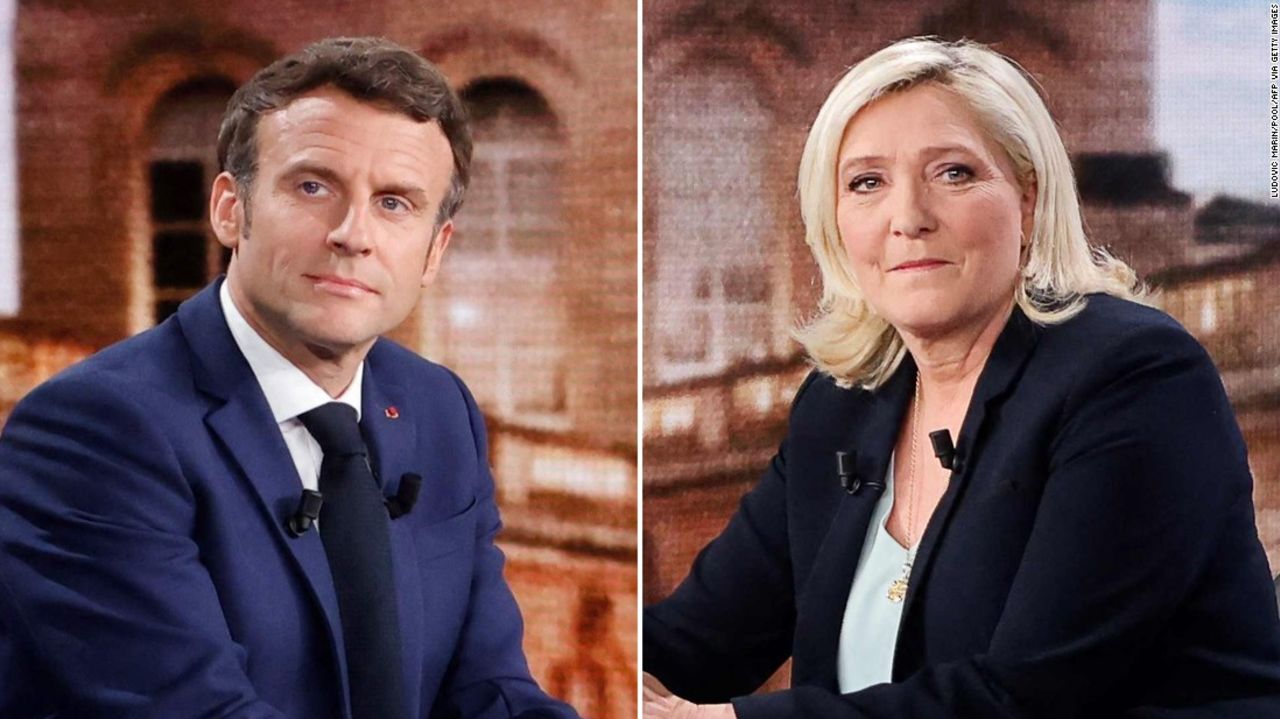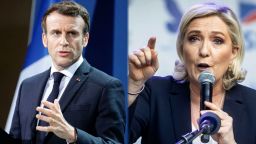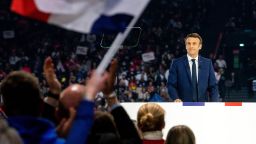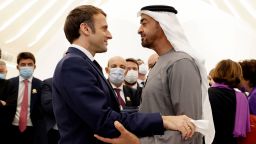Editor’s Note: David A. Andelman, a contributor to CNN, twice winner of the Deadline Club Award, is a chevalier of the French Legion of Honor, author of “A Red Line in the Sand: Diplomacy, Strategy, and the History of Wars That Might Still Happen” and blogs at Andelman Unleashed. He formerly was a correspondent for The New York Times and CBS News in Europe and Asia. The views expressed in this commentary belong solely to the author. View more opinion at CNN.
France, Europe and the free world have survived a substantial challenge to their collective well-being. While some 1,200 miles away, Russian President Vladimir Putin suffered a profound blow as Emmanuel Macrondefeatedfar-right challenger Marine Le Pen, a Putin ally, to become the first French President in a generation to win reelection.

The outcome of the contest between the two – France’s youngest leader since Napoleon and the three-time aspirant to become the nation’s first female President – was never a lock for either candidate. After a hard-fought first round among 12 candidates two weeks ago, the top two faced off in the runoff Sunday.
Shortly after the majority of polls had closed across the country, pollsters projected Macron to take 58.2% of the vote to Le Pen’s 41.8%.
Voters simply opted, in these challenging times, for a safe middle ground rather than a firebrand far-right candidate who promised to rip up the economy and society and pivot France ever closer to Russia – all in the interest of change that the French have never truly embraced. What Le Pen did do for most of her determined supporters was to demonstrate that she could be “presidential” – but president of a France where a majority of the French people are unlikely to aspire to living.
The size of Macron’s margin, despite the high abstention rate – the highest in at least two decades – could give him a substantial boost toward a definitive majority in the National Assembly when elections to fill its 577 seats are held in June.
Above all, Sunday’s election effectively did resolve, at least for the moment, the biggest question raised during the campaign: Do most French people really want to change all that much about their country and especially a government that has served them so well for the entirety of the Fifth Republic that has endured for nearly three-quarters of a century? Especially now that Macron is in the position of assuming the de facto leadership of Europe, filling the vacuum left by last year’s departure of longtime German Chancellor Angela Merkel.
Throughout the campaign, Macron defined what his second and final five-year term will look like with a passion equal to the attacks of his challenger, Le Pen, who painted France with a single-color palette. Her campaign manifesto included amending the French Constitution to restrict immigration she deemed a threat to France’s identity.
Macron observed that he wants a rainbow France, a nation receptive to new ideas at home or abroad, one that is comfortable as a leader of the European Union, NATO and the free world, that is prepared to stand up resolutely at any cost to tyranny abroad and at home.
Le Pen’s France would have sought a path toward accommodation with a Russia that is a pariah to much of the free world, and looked inward, pulling back from Europe. At the same time, she would have enforced a ban on headscarves for women or yarmulkes for men and staged referendums to disempower a legislature and judiciary she has never succeeded in dominating.
She outlined at the same time a tempting prospect of lower taxes and broad social expenditures – all most appealing to many in a nation where inflation has soared to levels not seen since 1985. But as Macron pointed out repeatedly, you have to find a way to pay for all of this.
Once the victory celebrations are over, the reelected President will have a full plate – and much of the world will be looking to him to set an agenda. Macron still has two more months as the titular leader of Europe in the rotating system that allows each EU country a six-month term. Hopefully, he will use that term wisely, continuing to rally the continent to stand up to Putin.
At the same time there will be challenges and opportunities: Finland and perhaps Sweden on the verge of seeking entry into NATO, Ukraine seeking a fast track for its own entry into the EU.
And at home, Macron will continue struggling with escalating inflation – matched across Europe – that is already requiring the continent’s leaders to find some path through the impact of any new energy sanctions that may be levied on Russia.
Then, there’s the growing refugee issue, some 5 million people having fled Ukraine in two months. The flow will continue, first to front-line EU members such as Poland, which has taken in 3 million already, as well as Romania and the Czech Republic, all of whom are anxious to see other nations assume some of the burden, particularly France and Germany. So far barely 30,000 have arrived in France, which has agreed to accept just 100,000 – a trickle in the face of a tsunami for which Macron may be forced to answer.
Beyond Europe, Macron will play a central role in navigating France’s widely heralded influence on the world stage. In Africa, there have been multiplying coups lately from Mali to Chad and Burkina Faso, accompanied by expanding terrorist activities in former French colonies, Macron was finally forced to withdraw military forces this year following scores of deaths in West Africa. France will continue to seek a path forward, working with like-minded African leaders to prevent Russian mercenaries from filling the vacuum.
And in the Middle East, Macron has already sought a reset with a host of countries where France has growing commercial interests, particularly Gulf nations that have become major purchasers of French military equipment and in the former French colony of Lebanon, which is suffering through a massive political and economic crisis. Macron has sought to position France in the Middle East and broadly across the world as a staunch and reliable partner, in places where a realignment away from traditional allies, particularly the United States, is underway.
In Asia, Macron will certainly seek to play a leadership role in steadying the increasingly fraught relationship between the EU and China. Both sides’ eagerness to expand trade has fallen afoul of human rights abuses and China’s continued support of Russia during its war with Ukraine.
At the same time, Macron was left bruised and infuriated by a Biden administration security pact with the UK and Australia (known as AUKUS), that in turn torpedoed a major submarine contract between France and Australia. The United States saw the trilateral pact as its new bulwark against China. That’s just now come into sharp relief since China signed a mutual-security pact with the nearby Solomon Islands, fueling fears Beijing may be seeking a major naval base in the region – all met with just a dollop of schadenfreude in some quarters of the Elysée.
Fresh from presidential victory, Macron is still faced with his greatest challenge if he is to be able to move forward with his broad menu of initiatives – another national election in June when voters will choose a new National Assembly. Many of those arrayed against Macron in the presidential contest will be seeking to unseat the comfortable legislative majority he has enjoyed. In many respects, this vote could be of greater long-term significance for Macron, France and its place in the world than the presidential race.
For the moment, however, the West still has a staunch and loyal ally with democratic aspirations and principles to play an anchor role in the future of Europe – one the White House will doubtless find appealing, as worried as the Biden administration was that Le Pen might find her way to the élysée presidential palace.
The United States would do well, then, to cherish this victory.




